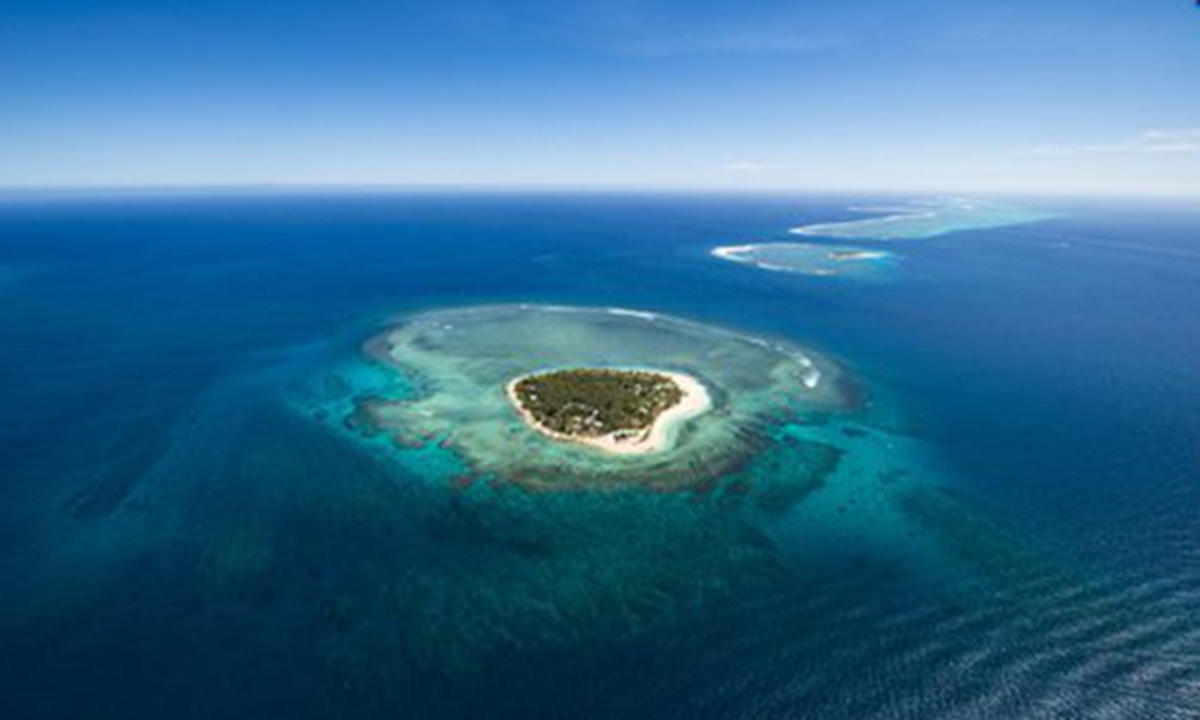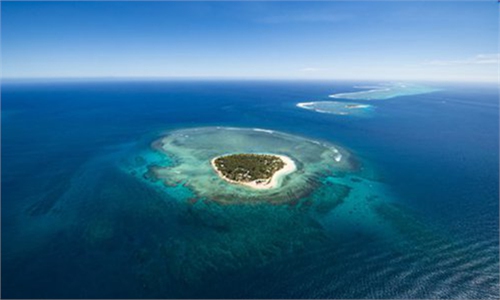When Fiji is in need, China is always there to help

A bird's eye view of Tavarua, a heart shaped island of Fiji Photo: Courtesy of Tourism Fiji
On January 4, with the title of "Australia's Influence in Pacific Islands Grows as China's Wanes," an article from Bloomberg News claimed that during the COVID-19 epidemic period, "China has largely been missing" in anti-epidemic support for South Pacific island countries. Meanwhile, the article noted that the Australian government promised to allocate a A$500 million (US$387.8 million) package including COVID-19 vaccines for Pacific neighbors to help their recovery from the epidemic.
Indeed, Australia has gradually increased its support for island countries such as Fiji in recent years. The relationship between the two countries has been restored to a close partnership from the freezing point after the 2006 coup.
But is China really doing nothing in the South Pacific as the Bloomberg article had claimed?
From the perspective of a person living in Fiji, China's help and support is everywhere. Since the outbreak of the COVID-19epidemic, China has done its best to help the South Pacific island countries. The Chinese government shared timely epidemic information, prevention and treatment experience and medical research results with the island leaders. Moreover, the Chinese governments at all levels, Chinese enterprises and local Chinese associations have been actively providing anti-epidemic funds and medical material assistance to the island countries.
Since March 2020, Chinese experts have conducted open forum discussions with their counterparts from the South Pacific island countries in terms of basic information, pathogenesis, and prevention and control of the virus. This kind of open discussion is particularly important for island countries with lagged virus information. Fiji, Samoa, and other countries have maintained the world's leading anti-epidemic achievements due to the implementation of good virus detection and isolation systems.
The epidemic is a severe test for island countries with weak healthcare system. Take Fiji. Basic protective materials such as masks, protective outfit and even hand sanitizers all rely on imports. Local hospitals do not even have enough doctors and nurses to take care of patients. In this case, Chinese governments at all levels have donated a large number of basic materials such as masks, isolation goggles and gloves to the island countries through various channels.
After problems with getting deliveries from France, French Polynesia sought help in March from China and managed to have first charter flight of medical supplies directly from China landed in Tahiti on April 6, 2020. The second charter flight flew by Air Tahiti Nui arrived in Tahiti and Fiji respectively on May 24 and 25 in 2020. The Fiji-China Friendship Association based in Fiji, in collaboration with the Tonga-based Pacific-China Friendship Association, has supported and coordinated the flight to Fiji.
In addition to the epidemic-fighting assistance, China didn't stop its assistance in other spheres. On June 30, 2020, the combined assistance by China's Ministry of Agriculture was delivered to local farmers in Vanua Island, Fiji, promoting the development of agriculture and fisheries in Fiji. In order to help the island countries improve their people's livelihood, on July 10, 2020 the Chinese Embassy in Tonga provided financial assistance to a Nukunuku community's pig raising project on Tongatapu, the country's main island.
It is worth mentioning that on Christmas Eve, Tropical Cyclone Yasa had a huge impact on Fiji. It left devastating damage to Vanua Levu, the second largest island of Fiji.
As a result, a large number of houses collapsed, water and electricity were cut off across the country, and about 1,500 people were forced to go to the disaster emergency evacuation center set up by the government to avoid the disaster.
The Chinese government acted in a timely manner and donated 420,000 Fijian dollars (US$ 208,530) to Fiji's National Disaster Relief and Rehabilitation Fund for TC Yasa.
Even though affected by the COVID-19 epidemic and with the Fijian economy stagnating, overseas Chinese still donate generously to raise funds and materials for the disaster area. On the second day after the disaster, various Chinese communities, organizations and enterprises in Fiji began to appeal for, organize, and arrange the post disaster reconstruction work.
Fiji Police Director Planning Aporosa Lutunauga arranged and received the group. He said that the Fiji New Chinese Association (FNCA) was the first organized Chinese Association to enter the disaster area. In addition, as of January 5, the FNCA had donated the largest amount of materials among nongovernmental organizations, with the value of all materials of about 15,000 Fijian dollars. "They sent the most needed food to the disaster area, which gave the villagers real help," Lutunauga said. "Their charity work brought more hope to the disaster area. Everyone is very grateful for what they have done."
As of Thursday, the post-disaster clean-up work in most villages and towns had come to an end. After villagers had enough food, they could devote more energy to rebuilding houses and other work.
Sami Salauca, chief of Yaqaga Island, said that the island is too remote. It's the farthest island northwest of Vanua Levu, and there are no other inhabited islands in the same direction until Solomon Islands. Salauca said it's hard to express how grateful they are for the group coming and presenting materials. He further added that the island welcomes Chinese relatives at any time as a second home.
All these vivid examples and real events fully illustrate that after the outbreak of the coronavirus epidemic, China and South Pacific island countries worked together. Respect for freedom and traditional culture has also been sincerely appreciated by the island people. As Chinese Ambassador to Fiji Qian Bo said, "Whenever there is a need, China is there."
The author is permanent secretary of the Fiji-based think tank South Pacific Island Countries Institute of Asian Studies (SPICIAS). opinion@globaltimes.com.cn


